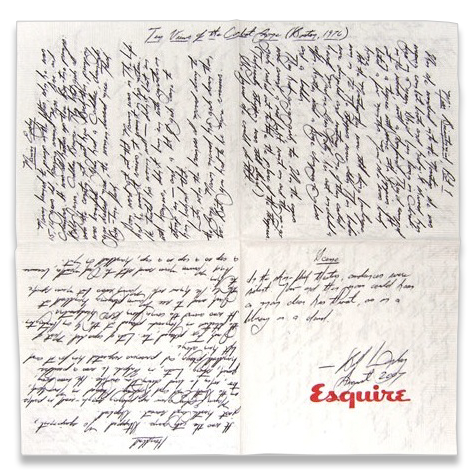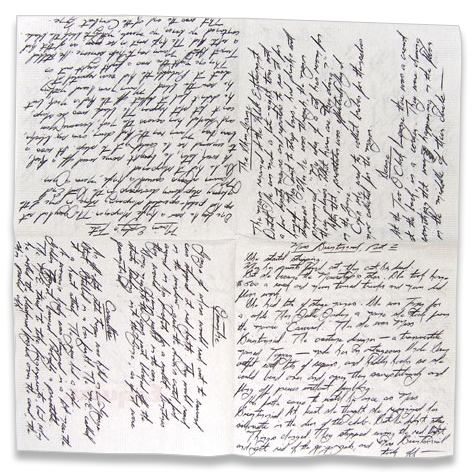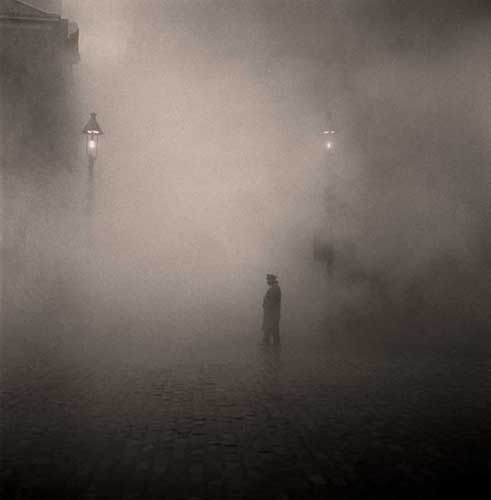“I have to have something to do that engages me totally. Without that, life is hell for me. I can’t be idle and I don’t know what to do other than write. If I were afflicted with some illness that left me otherwise okay but stopped me writing, I’d go out of my mind. I don’t really have other interests. My interest is in solving the problems presented by writing a book. That’s what stops my brain spinning like a car wheel in the snow, obsessing about nothing. Some people do crossword puzzles to satisfy their need to keep the mind engaged. For me, the absolutely demanding mental test is the desire to get the work right. The crude cliché is that the writer is solving the problem of his life in his books. Not at all. What he’s doing is taking something that interests him in life and then solving the problem of the book, which is, How do you write about this? The engagement is with the problem that the book raises, not with the problems you borrow from living. Those aren’t solved — they are forgotten in the gigantic problem of finding a way of writing about them.”
Ten Views of the Combat Zone


Since it looks like this blog is going to be a permanent thing, I’m going to try to gather up some of my other writing here. I don’t do a lot of writing outside my novels, and what I do is mostly for book publicity. But some of it is worth a second look, I hope.
“Ten Views of the Combat Zone (Boston, 1976)” is a short short story I wrote in 2007 for Esquire magazine’s “napkin fiction project,” which challenged writers to compose a story so short it could fit, hand-written, on a cocktail napkin. The napkins themselves were as interesting as some of the stories (mine is above).
I’ve been fascinated by the Combat Zone, Boston’s notorious old red-light district, for a long time now. I hope to write a novel about is someday soon. I pitched the idea once to my editor, Kate Miciak, as a follow-up to The Strangler. It seemed natural enough to follow a story of Boston’s 1960s crime scene with one set in the epicenter of the city’s 1970s crimeworld, the Combat Zone. Kate didn’t buy it. But we novelists are stubborn as mules when we think we’re onto something good. I’ll try again.
The complete text of the story is after the jump.
[Read more…] about Ten Views of the Combat ZoneWallace Stevens: “The House Was Quiet and the World Was Calm”
The house was quiet and the world was calm.
Was like the conscious being of the book.
The words were spoken as if there was no book,
Wanted to lean, wanted much to be
The summer night is like a perfection of thought.
The quiet was part of the meaning, part of the mind:
And the world was calm. The truth in a calm world,
Is calm, itself is summer and night, itself
— Wallace Stevens
Why authors should (and shouldn’t) blog
I began this blog for a purely mercenary reason: to sell more books. But I discovered to my surprise that I enjoy doing it. Good thing, too, because after three months at it I seriously doubt this blog will ever be an effective sales tool.
Of course, the logic behind author blogs is unimpeachable. The blog attracts new readers as flowers attract bees. These new readers, stupefied by the insights to be found here, return again and again until they decide they simply must have more, at which point they rush out (or more likely click) to buy a book, which they take to be like a blog post only very much longer. Or something like that.
The problem is not that this sort of thing cannot happen. It does. It has happened to me, in fact. The problem is that, as book-selling strategies go, this one is massively inefficient. The number of visitors is just too small to justify the investment of time. More important, counterintuitive as it sounds, most visitors to this blog simply aren’t interested in my books.
In the first few months of my blog’s existence, the overwhelming majority of traffic has come from Google. (I know this because statistics about blog traffic are harvested by several services.) Google referrals tend to be one-time visitors, not regulars. And they come looking for all sorts of things. Here is a small sample of the Google searches that have led people here: “Boston + movies,” “friends of eddie coyle,” “philip roth writing method,” “Graham Greene words per day,” “alphasmart neo.” Do you see a pattern? Me neither. Well, I see one: often as not, these people are not Googling “William Landay.” Of course I’m delighted to have visitors stumble upon my blog this way. That is the whole flowers-and-bees strategy, after all. But there is no reason to expect that these readers will be easy to convert to fans. Most of them have never even heard of me. A few I might be able to sway, but how many and at what cost in time?
Of course, a fraction of my blog traffic does come for the “right” reasons, that is, they enjoy my books or my blog, or both. For them alone, writing this blog would be worthwhile, not because it is going to goose them into reading my books (they already do that), but because core fans want and deserve a place where they can get a better sense of the writer behind the books or even contact him. What’s more, it is valuable to me to have them here. Novel-writing is a grueling, solitary business. The company of these readers — the occasional messages they send or comments they leave, the encouragement — is enormously heartening.
Which leads me to the main point. Even though a blog may never yield a single additional sale, I heartily recommend that all writers launch one anyway. Just remember why you are doing it: because you enjoy it, not because you think it will turn you into a bestseller. Only your books — and a boatload of luck — can do that.
Of course if you are blogging for pleasure rather than to impress potential book-buyers, your blog will look a little different. It will be a truer reflection of yourself, your personality, your quirky tastes. This blog has been a little dry and generic, I think. I have been reluctant to post anything that was not “A” material, longish essays full of deepish thoughts. The result has been a blog with none of the serendipity that characterizes the blogs I enjoy most.
Take Terry Teachout’s blog about theater and the arts, About Last Night. I have been reading ALN for years with great pleasure because I never know what I will find there. It might be a longish essay full of deepish thoughts, but it also might be a YouTube video, a snippet from a book Terry is reading, a notice of an art exhibit. The randomness is what makes it fun.
I am going to tack in that direction myself here. The last few days I have posted a quote, a picture, a video, and a poem, little stuff I would previously have bit.ly’ed and lobbed into the bottomless black hole of Twitter. Look for more of that. Finds like these are what “web logs” originally were: scrapbooks of the interesting nuggets people ran across as they went sniffing around the web. It’s why blogs like Terry Teachout’s work so well, why they keep renewing themselves with a mix of found and original material. This blog should be more fun than it has been, for you and me both.
Philip Larkin: “This Is the First Thing”
This is the first thing
I have understood:
Time is the echo of an axe
Within a wood.
— Philip Larkin
Book Three Update
A quick update on my novel in progress. The first draft is roughly half written, and the feedback has been overwhelmingly positive. Not only has the book been sold in the U.S. and UK, but we have a new and very enthusiastic publisher in Norway, Versal Forlag. I have had lots of overseas sales, but never in Norway. Takk skal du ha, Versal Forlag. The book continues to be shopped overseas and things are looking quite good, even though at this point all we are showing is a hundred manuscript pages and an outline of the rest. There has even been some movie interest. So, all signs are very positive. In this economy, I am especially thankful for that.
With the business side of things taken care of, I am free to concentrate on the book itself. It is foolish for a writer to talk about an unwritten book, so for now I won’t get into the substance of the plot. Suffice it to say, the manuscript is due on my editor’s desk by April 1, 2010, but I have set a personal deadline of January 1. I have fallen a few weeks behind that schedule, but I am still optimistic I can make up the lost time.
The story, very roughly, is a courtroom drama, with the trial beginning exactly at the midpoint of the book. I think once the trial sequence begins I can write fairly quickly. I am comfortable writing about the courtroom. It is an area I know a little about, having been a prosecutor for several years. The courtroom is also a circumscribed, structured environment. Trials move along in formal, scripted ways, like minuets, with room for just a few dashes of drama and improvisation. No wonder writers are attracted to them. The goal now is to begin that trial sequence September 1. This is how novels are written: not in one leap, but in a series of small, discrete steps. Page by page, scene by scene, one interim deadline after another. The trick is not to look up — you might see how high the mountain above you really is.
Barbara Mensch’s photographs of New York
Gorgeous images of New York City by photographer Barbara Mensch. Some background information about Barbara Mensch is here.
“No battle plan…”
“No battle plan survives contact with the enemy.”
